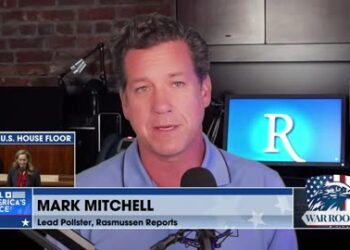FIX BAYONETS: Bannon Calls On WarRoom Posse To Hold Political Class To Account On Spending Cuts
Steve Bannon issued a stark warning about impending political and fiscal confrontations. He predicts that by mid-March, the convergence of efforts to dismantle the administrative state and the necessity for significant federal budget cuts will become evident.
Bannon highlights the movement of Elon Musk’s team into the Pentagon as a strategic shift in defense operations, signaling a broader initiative to restructure government functions. He emphasizes the importance of “impoundment,” a process allowing the executive branch to withhold allocated funds, as a critical tool for the administration to control spending and reduce the national debt.
Anticipating a political “firestorm” between March 4 and March 14, Bannon foresees a contentious battle over federal spending, especially with the expected implementation of a Continuing Resolution (CR) due to Congress’s incomplete appropriations process. He urges supporters to prepare for challenging decisions, underscoring the administration’s commitment to substantial spending cuts to address mounting deficits.
Bannon remains confident in achieving legal victories at the federal level, despite potential initial setbacks, and stresses the necessity of confronting the political class to enforce fiscal responsibility and curb inflation.
Dave Walsh Reacts To President Trump Establishing The National Energy Dominance Council
Steve Bannon and Dave Walsh discussed the critical need for energy dominance under President Trump’s leadership, emphasizing its role in the economic and industrial resurgence. Bannon underscored the importance of eliminating radical energy policies, such as net carbon zero initiatives, which he argues have deindustrialized Western economies while benefiting China. He praised Trump’s establishment of the National Energy Dominance Council as a decisive move toward energy independence.
Walsh highlighted the failures of the past five years, noting that 91% of capital investment in power generation went to unreliable renewables, leading to economic inefficiency and rising costs. He pointed out that under Biden, misguided policies favored intermittent energy sources like wind and solar, which operate only 25% of the time, causing electricity shortages.
Bannon and Walsh agreed that shifting to base-load energy sources—such as natural gas, nuclear, and clean coal—was crucial for economic stability. Walsh praised Trump’s efforts to reinstate pipeline projects and reduce reliance on foreign energy imports. He emphasized that full-spectrum energy dominance is essential for AI, heavy industry, and economic growth.
Bannon noted that even Silicon Valley elites, once proponents of net-zero policies, have realized AI’s energy demands and are now aligning with Trump’s energy agenda. The conversation framed Trump’s policy shift as essential to secure economic prosperity and national security.
"WE’RE OUT,” Bannon Calls On Europe To Put Their Own Money Up For Zelensky’s War
Steve Bannon outlined a strategic and economic vision focused on major policy shifts under a potential second Trump administration. He emphasized organizing for the next phase of political and economic battles, highlighting reconciliation bills, supply-side tax cuts, and significant federal spending reductions. His plan includes eliminating waste, fraud, and abuse while making strategic cuts to government programs.
On foreign policy, Bannon criticized continued U.S. financial and military commitments to Europe, particularly NATO and Ukraine. He argued that European nations should take responsibility for their own defense, asserting that the U.S. is no longer willing to underwrite these alliances. He dismissed further involvement in Middle Eastern conflicts, advocating for alternative strategies beyond military intervention.
Bannon stressed a geostrategic reorientation toward hemispheric defense, prioritizing naval power and control over key locations like the Panama Canal, Greenland, and the Pacific’s three island chains. He emphasized that national security threats stem more from excessive government spending than external adversaries.
Economically, he linked Medicaid and workforce disengagement, criticizing elites for policies that have weakened the labor market. He pushed for reintegrating young men into the workforce instead of expanding welfare programs. Bannon also condemned corporate bailouts and wealth concentration, rejecting further benefits for the elite at taxpayers’ expense.
He praised Trump’s diplomatic stance with Russia and China, advocating direct engagement with leaders rather than prolonged conflicts. Bannon concluded by stressing the need for smart, cost-effective strategies that prioritize American interests without entangling the country in endless foreign wars.
DETERRING WAR: Capt. Fanell On Returning America To Being A Naval Power
Steve Bannon and Captain James Fanell discussed the strategic realignment of U.S. military priorities, particularly in the Indo-Pacific, emphasizing the vastness of the Pacific Ocean as a natural defense barrier. Fanell noted that President Trump understood the importance of the region, especially in collaboration with India and the Seventh Fleet, while warning against ceding influence to China. Bannon criticized past U.S. involvement in Middle Eastern wars, arguing that the mistakes of the past should not be repeated, and rejected efforts to entangle America in another conflict in Persia.
Bannon stressed that the United States will no longer underwrite the post-war international order, which has been heavily reliant on American taxpayers and military personnel. He asserted that Europe, with its wealth, should take greater responsibility for its own defense rather than depending on the U.S. He framed this shift as a move towards America First policies, emphasizing that the U.S. seeks allies, not protectorates.
The conversation also touched on the bloated Pentagon budget, reckless foreign aid spending, and the need for accountability in Washington’s financial decisions. Bannon highlighted how trillions spent on wars in Iraq and Afghanistan could have been reinvested in the U.S. He criticized the establishment for treating the American people as a resource for their global ambitions while ignoring the working and middle class.
Bannon urged his audience to take control of their political agency through grassroots movements like the precinct strategy, emphasizing that political elites fear citizen engagement. He concluded with a call for resilience and strategic organization, drawing comparisons to historical revolutions and stressing that despite setbacks, the America First movement is growing in strength and influence.
"This Is Going To Get Constitutional Quickly.” Bannon On President Trump’s Theory Of Impoundment
This is a highlight from the first segment.




